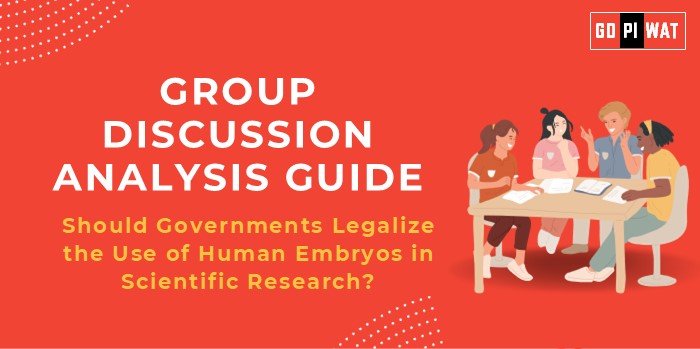📋 Group Discussion (GD) Analysis Guide: Should Governments Legalize the Use of Human Embryos in Scientific Research?
🌐 Introduction to the Topic
Opening Context:
Scientific research involving human embryos remains one of the most ethically debated topics, intersecting medical breakthroughs with philosophical and moral considerations. Globally, countries have diverse regulations reflecting societal values and scientific priorities.
Topic Background:
Human embryonic research has been pivotal in advancing regenerative medicine, particularly stem cell research, which offers potential treatments for degenerative diseases. However, ethical concerns regarding the sanctity of life and religious beliefs create a persistent conflict between scientific innovation and moral boundaries.
📊 Quick Facts and Key Statistics
- 🌍 Global Legal Landscape: 20+ countries regulate embryonic research; 10 explicitly ban it.
- 💰 Stem Cell Market: Projected to reach $27 billion by 2030, driven by medical applications.
- 🩺 Disease Impact: 30+ degenerative diseases, including Alzheimer’s, could benefit from stem cell research.
- 📊 Moral Sentiment: Surveys show 60% of people in developed nations support limited embryo use in research.
🧩 Stakeholders and Their Roles
- 🏛️ Governments: Establish regulations and fund ethical research initiatives.
- 🔬 Medical Researchers: Utilize embryos for breakthroughs in treating incurable diseases.
- ✝️ Religious Institutions: Advocate for moral considerations and respect for life.
- 👩⚕️ Patients: Stand to benefit from life-saving treatments and therapies.
🏆 Achievements and Challenges
✨ Achievements:
- 📈 Medical Breakthroughs: Embryonic stem cells have enabled advances in organ regeneration and genetic disease correction.
- 🌐 Scientific Collaboration: Global research partnerships drive innovation and shared ethical standards.
- 💵 Economic Growth: Biotech companies leveraging embryonic research have bolstered local economies.
⚠️ Challenges:
- 🔍 Ethical Concerns: Diverse cultural and religious perspectives complicate consensus.
- 🌍 Policy Variability: Disparate global laws hinder cross-border collaboration.
- 🧪 Alternative Technologies: Emerging non-embryonic stem cell technologies challenge the necessity of using embryos.
🌎 Global Comparisons:
- 🇬🇧 United Kingdom: Regulates embryonic research under strict oversight, allowing limited use for medical advancements.
- 🇺🇸 United States: Faces divided public opinion; funding depends on the administration.
💬 Structured Arguments for Discussion
- Supporting Stance: “Embryonic research is crucial for developing treatments for incurable diseases and aligns with society’s broader commitment to improving healthcare.”
- Opposing Stance: “Legalizing embryonic research undermines moral principles, setting a dangerous precedent for commodifying human life.”
- Balanced Perspective: “While embryonic research offers immense medical potential, its regulation must respect ethical concerns through stringent oversight.”
📚 Effective Discussion Approaches
Opening Approaches:
- 📖 Start with a medical success story powered by embryonic research.
- 🌐 Use global legal frameworks to contextualize the debate.
Counter-Argument Handling:
- 🛡️ Rebut Ethical Concerns: Highlight strict regulations to mitigate misuse.
- ⚖️ Address Policy Issues: Argue for standardized international laws to promote collaboration.
📈 Strategic Analysis of Strengths and Weaknesses
- ✔️ Strengths: Medical potential for degenerative diseases, advances in scientific understanding, controlled regulatory frameworks.
- ❌ Weaknesses: Moral and ethical dilemmas, public misperceptions, high research costs.
- 💡 Opportunities: Expansion in regenerative medicine, global policy alignment for ethical research.
- ⚠️ Threats: Religious opposition, alternative research methods reducing demand for embryonic use.
🏫 Connecting with B-School Applications
Real-World Applications:
- 🤝 Ethical leadership in controversial fields.
- 📜 Policy-making strategies for societal balance.
Sample Interview Questions:
- ❓ “How should governments navigate ethical dilemmas in medical research?”
- ❓ “What role do private companies play in balancing innovation with ethics?”
Insights for B-School Students:
- 🧠 Debate reflects strategic decision-making in ambiguous scenarios.
- 🌍 Topic showcases innovation versus ethical governance.


